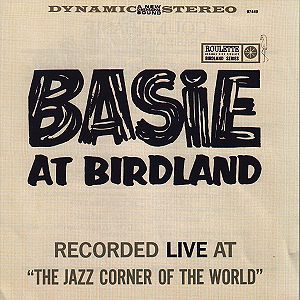1. Little Pony
2. Basie
3. Blues Backstage
4. Blee Blop Blues
5. Whirly-Bird
6. One O'Clock Jump
7. Good Time Blues
8. Segue In C
9. One O'Clock Jump
10. Easin' It
11. A Little Tempo, Please
12. Corner Pocket
13. I Needs To Be Bee'd With
14. Discommotion
15. Segue In C
16. Whirly-Bird
17. One O'Clock Jump
Count Basie – Piano
Thad Jones, Sonny Cohn, Lennie Johnson, Snooky
Young – Trumpets
Quentin Jackson, Henry Coker, Benny Powell –
Trombones
Marshal Royal – Alto sax, clarinet
Frank Wess – Alto sax, tenor sax, flute
Frank Foster, Budd Johnson - Tenor saxes
Charlie Fowlkes - Baritone sax
Freddie Green - Guitar
Eddie Jones - Bass
Sonny Payne - Drums.
Jon Hendricks – Vocals (track 5)
I
never really took to the Count Basie Orchestra
when I was a novice jazz fan, probably because
most of his early recordings somehow didn’t
capture the live atmosphere of the band. However,
two things changed my opinion. The 1957 album
The Atomic Mr Basie proved what the
band could really do – an impression that
was fortified by hearing the band at London’s
Royal Festival Hall. It was a knockout, as
the hall’s acoustics allowed us to hear just
how powerful the band could be in a concert
setting. I became – and remain – a convert.
This
CD was recorded in 1961 at Birdland in New
York City, by virtually the same line-up as
I heard in London, and it captures the vigorous
punch of that ensemble. The album kicks off
(and I do mean "kicks") with Little
Pony, written by Neal Hefti - the man
who crafted The Atomic Mr Basie. Frank
Foster contributes a storming tenor sax solo
and the typically driving Basie rhythm section
keeps the whole thing moving. Basie opens
the second (eponymous) track on gentle piano,
with drummer Sonny Payne interpolating some
stunning punctuation. Throughout this album
we are reminded of Sonny’s brilliance – not
only by the way he underlines every accent
but also for catalysing the band with his
dynamic enthusiasm. Blues Backstage
is one of those bouncy slow-burners that Basie
did so well. It includes a laid-back solo
from tenorist Budd Johnson and some high-note
showing-off by trumpeter Snooky Young.
Neil
Hefti’s Whirly-Bird introduces singer
Jon Hendricks who scats his way through the
tune, while Good Time Blues allows
Count Basie to stretch out at the piano in
leisurely fashion, with some rather distracting
background conversation from the audience
(and probably the band), after which Quentin
Jackson preaches eloquently on trombone. Jackson
solos again on the jaunty Segue in C,
which runs for nine gorgeous minutes of bluesy
musicianship, starting with Basie’s piano
and including Budd Johnson’s mellow saxophone
as well as Frank Wess’s flute in harmony with
the trumpets. It proves conclusively that
this band was supreme in the art of swing.
The Basie signature tune, One O’Clock Jump,
starts as expected with the Count’s bubbly
piano backed by the perfect rhythm of Freddie
Green and Eddie Jones, before Sonny Payne
ignites the proceedings to make way for solos
from Frank Foster and Benny Powell.
The
original 1961 LP ended at this point, but
the remastered CD contains no fewer than eight
extra tracks, also recorded at Birdland. These
include alternate takes of Segue in C
and Whirly-Bird (the latter without
Jon Hendricks but with a burning solo from
Budd Johnson). Other highlights include the
massive sax section sound and the duelling
trombones and trumpets on Easin’ It,
and Frank Foster’s composition Discommotion
with its unusual voicings. Even without these
bonus tracks, the album would be well worth
buying but the additions make it a veritable
cornucopia of fine music.
Tony Augarde
